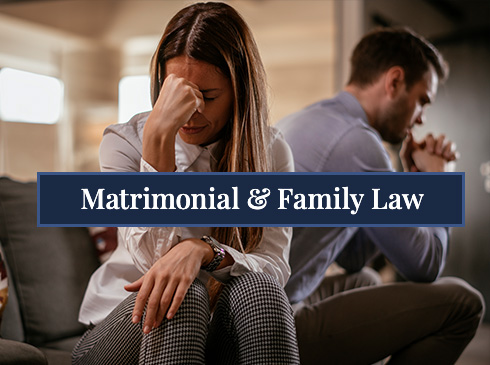Our attorneys handle all aspects of family law issues including, but not limited to:
- Divorce
- Separation
- Child custody
- Child support
- Spousal support
- Equitable distribution of marital property
- Prenuptial and postnuptial agreements
- Separation Agreements
- Same-Sex Marriage/Divorce Issues
- Life and health insurance
- Orders of protection
- Paternity
We believe that people should be empowered by their attorneys to make powerful and positive decisions concerning family law issues that they are involved with. We offer our clients many alternatives, such as mediation, collaborative law, arbitration and traditional litigation, so that their legal issues can be resolved as expeditiously and positively as possible. We know how emotional family law issues can be and we strive to be there for our clients every step of the way.
Useful Information in the Event You Are Considering Divorce:
- Call an attorney for a consultation early on in the process once you are giving serious thought to getting divorced. Even if you are not yet sure, it is good to get some “basic strategies” before things go too far.
- Obtain as much financial information about your spouse as you can before you see an attorney. Often your spouse will leave much important financial information “lying around” that you can copy, but once parties seriously contemplate divorce, these documents tend to disappear.
- If there is any physical violence by your spouse, especially in front of the children, don’t hesitate to call the police. Ask the police for a copy of their Domestic Disturbance Report and think long and hard about whether you wish your spouse to be arrested and whether you wish to proceed in Family Court and/or Criminal Court. A Criminal Complaint is much more serious than a Family Court Complaint.
- It is permissible for you to tape record your own conversations (whether over the telephone, in-person or otherwise) with anyone else. You may not tape record a conversation between two other people unless one of them consents. Tape recordings can be very useful in negotiating a settlement and sometimes are admissible in evidence at a future trial.
- Consider Mediation and/or Collaborative Law as an alternative to litigating in the Court System. Mediation is basically defined as an attempt to effect a peaceful settlement between disputing parties through the help of a neutral third person. Collaborative Law is where both parties hire lawyers to cooperatively with the other side negotiate an acceptable settlement. These two alternatives are often less adversarial, less expensive and less time consuming than traditional litigation.






